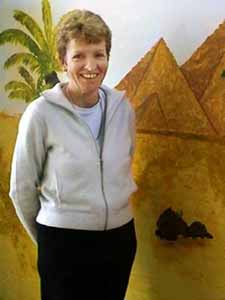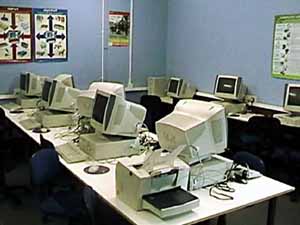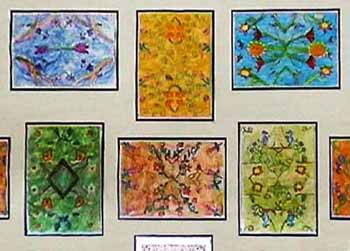Career interview: Primary teacher
For much of her 27 years as a primary school teacher, Maureen Matthews has been a maths coordinator, with particular responsibility for maths teaching across her whole school. But, as she tells Plus, it wasn't until she started teaching that she even realised that she had any talent for maths.
The first steps

Maureen standing in front of a mural of Egyptian pyramids produced by her students in art class
Perhaps surprisingly for someone whose entire career has been in the education system, Maureen says: "I wasn't a very good scholar - for much of my school career I thought I wasn't very clever at all!" This perception was probably in part because of her two extremely clever older sisters, one of whom studied at Oxford and the other at Cambridge. Unsurprisingly, given that this is how she felt, she didn't enjoy secondary school particularly, and originally intended to leave at 16 after doing her O-levels (this was in the days before GCSE's) and find a job. "I looked at a lot of different jobs, but I really would have gone in at the bottom rung of the ladder. Now I think I would have been able to progress up through, I wouldn't have had to stay at the bottom. But at the time I didn't have the qualifications. Big companies said 'go back to school and do your A-levels, go to university and then reapply'. So I decided to go back to school."
But the year Maureen started her A-levels, her school went comprehensive, like many other grammar schools at the time. Previously, children would have had to pass an academic exam to be accepted into the school - those who failed went to a "secondary modern". But the Government of the time was determined to replace this selective education system with a comprehensive one. For many schools, including Maureen's, the changeover was traumatic. "Instead of taking another 100 11-plus passes they took in another 100 13-year old failures from another school and the teachers didn't know what to do with them. They weren't prepared for children of that age who couldn't read. We hardly had teachers in the sixthform because all the staff were busy working with these children. The whole school suffered from it and particularly my year and the year ahead of me had very poor A-level results compared to previous years and to expectations."
With all this upheaval it wasn't so surprising that, after doing well at O-level, Maureen failed her A-level maths. But at least she now knew what she wanted to do - to go on to Teacher Training College and become a primary school teacher. In this she was partly influenced by her mother, who was a teacher - although "she thought it was the funniest thing of all, because I hadn't been a very keen scholar, and here I was going back for more!" Initially, Maureen applied to do English, and then she transferred to Geography. Maths hadn't occurred to her at this point as a specialisation, particularly after having her confidence dented by her A-level results. After three years she left Milton Keynes College of Education with a teaching certificate.
From literacy to mathematics
Maureen started teaching in 1975. Like other new teachers, she taught all subjects, and had no particular responsibility for any one. After a couple of years she was appointed literacy coordinator for her school, and after teaching for around seven years, she decided to go to Hatfield Polytechnic (now the University of Hertfordshire) and study for a degree part-time in the evening. "The profession was going graduate, and I didn't have a degree - not that that would have counted against me at all - I did it for my own satisfaction." Her teaching certificate gave her credit towards the degree, so it only took her three years part-time to gain a degree in Education. "It was hard work," she says. "I wouldn't do it now!"
After 13 years in the same school, Maureen finally decided to move on, to Fleetville Junior School in St. Albans, just outside London, where she still teaches today. "There had been a lot of changes in the school that I was working in - it had a new head and it seemed like a good time to move. I had applied several times previously for jobs in different schools but each time the old head had promoted me or given me more money so I didn't actually take any of the offers up!" By this time, she had realised that she particularly enjoyed teaching maths, and when she arrived at her new school, she discovered that the maths coordinator was retiring at the end of the school year. So she asked to be considered for the post, but explained that she wanted to do some maths training ahead of taking it on.

A poster of maths keywords on the wall of Maureen's classroom
The school allowed her one day release a week to attend Hatfield Poly and do a diploma in primary maths teaching. "It was a really good opportunity and I really enjoyed it. I certainly felt it helped me in my teaching." She also appreciated being released from teaching duties to take the course: "So many teachers' courses are in the evenings. So you would have done a day's work and then be expected to study."
For the first three terms of the Diploma she attended classes at the Polytechnic, and for the fourth term she worked back in her school, both with her own class and other classes. "At that time I had a particularly brilliant group of mathematicians in my class," she says. "I think that inspired me to go on and do more with them."
Maureen found the course fascinating. She and her fellow students weren't only learning about teaching maths, but were actually studying maths themselves. "We studied things like probability that I had never done at school. I had taught very basic probability to children but I had never investigated anything like the lottery." She says that a particular benefit of the training was the way it helped her to train other teachers within the school. "As times have changed over the years we've had to do a lot more of one teacher taking responsibility for training other teachers in schools. I've had to lead an awful lot of INSET sessions."
Continuing professional development is particularly important for teachers, because of the changes in education over the last few decades. "When I was at school", Maureen says, "maths was all very much textbook-based. There wasn't really any interaction with the whole class - you sat down, you did the question and you wrote the answer." Today Maureen's classroom couldn't be more different. "Now you're much more likely to come in and start firing questions around the classroom; somebody will ask you something and you'll ask somebody else to explain, it's much more give and take. You're much more likely to set a problem: 'How would you go about solving this? What's the mathematics involved? Are there other ways of doing things? Does anybody have a quicker method to use? Can anybody give us a way of proving that this is the right answer or the wrong answer?' There is much less emphasis on 'this is the way you record it, we all do it the same way', and much more thinking about logical ways of working through a problem."
Everything's connected

Students' computer-produced images combining their understanding of shape through maths and art
Maureen feels that primary education works particularly well when links are made between different subjects. "It might be Red Nose Day or something like that, where the children are raising money, counting the donations, but you're still doing maths." As a keen art teacher, she enjoys working with students on such topics as symmetry, where there is scope for projects creating designs that are both beautiful and mathematically instructive. ICT is another particular interest of hers, and her students use their mathematical understanding of shapes and patterns and artistic creativity to create artwork using computer design programs.
There are computers in every classroom in the school, and they are used more and more - right across the curriculum, but particularly in maths. There are all sorts of programs teaching children particular mathematical skills - for example, Maureen says that teaching a child to use a protractor is much easier using a specialist computer program. "The children are fine if it's a right angle or if it's in front of them this way [demonstrates] but if it's at an awkward angle they can spend a long time."

The computer suite at Fleetville Junior School
Maureen sees the benefits of using computers in her teaching - in particular, she says, many children really need something to look at to help them learn, rather than just to be talked to. "Computers and other technology can be a great help in increasing the range of maths that we're able to teach," she says. "At the same time we do recognise that many of the children have tremendous skills through their use of home computers and don't always appreciate what they see as some of less appealing tasks that are set in school. They are used to everything being multi-coloured and interactive. They have high expectations of being entertained, but as teachers we should see this as a challenge to keep them all motivated by using and developing their skills."
Of course, some students are better at maths than others - but even the weakest students can be helped by teaching them what Maureen calls tricks of the trade. "Just like you can never learn every single word you're ever going to need to read - you learn the skills to decode a passage when you see it - well, it's the same with numbers. You could never learn the answer to every single calculation, you learn to look and see is there a quick way. So you teach the children to remember to use the tools they've got; for example, not to try to hold too much information in their heads but to jot down a halfway calculation that they can refer back to."
Although much of the substantial amount of change Maureen has seen in the profession during her 27 years as a teacher has been good - "if you scrapped all the curriculum tomorrow, we wouldn't go back to what we were doing before" - she says she finds the prescriptiveness difficult to cope with. "I find it hard to keep the children motivated through things that have been imposed on you, rather than you doing something that's come from them. We would do better to promote an enjoyment of the subject. If they go in with a positive attitude, they're going to do better."
A warm welcome waiting
Maureen says that, although not many of the primary teachers she has worked with over the years have done maths past GCSE, a primary school teacher who had A-level maths "would be welcomed with open arms". This is more because it indicates enthusiasm and confidence in maths, than because that level of mathematics is needed for the syllabus. "I don't think you have to be a brilliant mathematician at this level, you just have to like the subject. If you like numbers and you like playing around with numbers and you see the patterns in numbers, maths can't be difficult.
"I think if you had a great love of maths, you would almost certainly be steered towards secondary teaching, especially as secondary schools are absolutely crying out for maths specialists. In a primary school you teach 5 lessons a day, 25 a week, and only 5 of them are maths; all the rest of the time you're teaching art, PE, and everything else, so if it's maths that you love, you would probably want to go and teach it more than you do in a primary school.
"But if you want to do something with a mathematical leaning, there will always be opportunities. Every school has to have a coordinator who oversees all the maths throughout the whole school. You might go into a school that already has a well-established maths department, but usually they're only too pleased to have other people working alongside and sharing."

There are always opportunities to raise the profile of maths within the school, such as this display of symmetric designs produced by Maureen's students
And don't forget that at the time Maureen went into teaching, she had no particular love of maths. She says that many teachers find that through teaching they gain an understanding of material they didn't understand fully themselves when they were at school. "Maths that they didn't particularly understand when they were in school, they learn so much more themselves - things that you remember being taught, 'well I'll do it that way because that's what I've been taught to do but it doesn't make any sense to me!' and suddenly it slots into place."
This, she says, is one of the joys of the profession. "In primary school it's not assumed that you know absolutely everything. A lot of the time you're learning alongside the children. That's one of the nice things about it. You're always learning something new."
Maureen's advice for anyone thinking of teaching as a career is simple. "Go into a school and do some work with students and see what this job entails. When a child suddenly sees the light I say 'yes, that's why I do it', but some people will say 'that's just not for me' because it is constant hard work and you can never predict what's going to happen the next minute.
"The children don't always realise how often they use maths in their daily lives, such as when they count out equipment, check the football scores or spend their pocket money. They may see their parents measuring up for decorating or weighing out ingredients for cooking, but fail to see that these are practical uses of mathematical skills.
"But if these things aren't maths then what are they?"
About this article
You can find more great maths careers in our Careers library, which is growing all the time.Helen Joyce is editor of Plus.